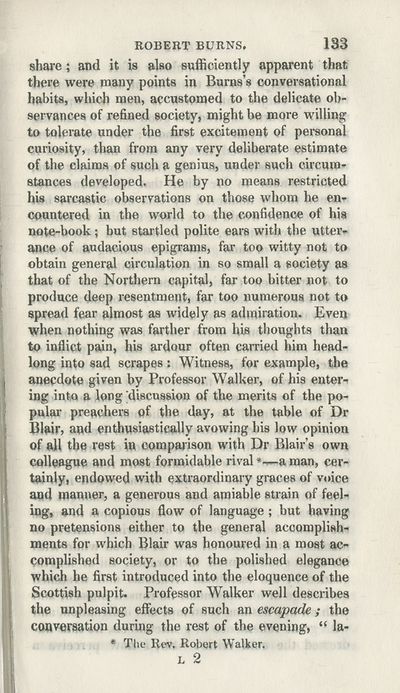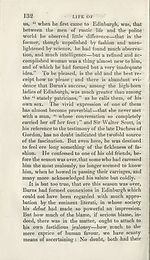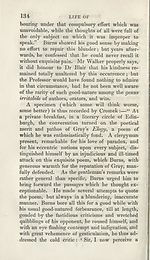Scotland/Scots > Life of Robert Burns
(143)
Download files
Complete book:
Individual page:
Thumbnail gallery: Grid view | List view

ROBERT BURNS. 133
share; ami it is also sufficiently apparent that
there were many points in Burns’s conversational
habits, which men, accustomed to the delicate ob¬
servances of refined society, might be more willing
to tolerate under the first excitement of personal
curiosity, than from any very deliberate estimate
of the claims of such a genius, under such circum¬
stances developed. He by no means restricted
his sarcastic observations on those whom he en¬
countered in the world to the confidence of his
note-book; but startled polite ears with the utter¬
ance of audacious epigrams, far too witty not to
obtain general circulation in so small a society as
that of the Northern capital, far too bitter not to
produce deep resentment, far too numerous not to
spread fear almost as widely as admiration. Even
when nothing was farther from his thoughts than
to inflict pain, his ardour often carried him head¬
long into sad scrapes: Witness, for example, the
anecdote given by Professor Walker, of his enter¬
ing into a long discussion of the merits of the po¬
pular- preachers of the day, at the table of Dr
Blair, and enthusiastically avowing his low opinion
of all the rest in comparison with Dr Blair's own
colleague and most formidable rival *—a man, cer¬
tainly, endowed with extraordinary graces of voice
and manner, a generous and amiable strain of feel¬
ing, and a copious flow of language ; but having
no pretensions either to the general accomplish¬
ments for which Blair was honoured in a most ac¬
complished society, or to the polished elegance
which he first introduced into the eloquence of the
Scottish pulpit. Professor Walker well describes
the unpleasing effects of such an escapade; the
conversation during the rest of the evening, “ la-
* The Rev, Robert Walker.
L 2
share; ami it is also sufficiently apparent that
there were many points in Burns’s conversational
habits, which men, accustomed to the delicate ob¬
servances of refined society, might be more willing
to tolerate under the first excitement of personal
curiosity, than from any very deliberate estimate
of the claims of such a genius, under such circum¬
stances developed. He by no means restricted
his sarcastic observations on those whom he en¬
countered in the world to the confidence of his
note-book; but startled polite ears with the utter¬
ance of audacious epigrams, far too witty not to
obtain general circulation in so small a society as
that of the Northern capital, far too bitter not to
produce deep resentment, far too numerous not to
spread fear almost as widely as admiration. Even
when nothing was farther from his thoughts than
to inflict pain, his ardour often carried him head¬
long into sad scrapes: Witness, for example, the
anecdote given by Professor Walker, of his enter¬
ing into a long discussion of the merits of the po¬
pular- preachers of the day, at the table of Dr
Blair, and enthusiastically avowing his low opinion
of all the rest in comparison with Dr Blair's own
colleague and most formidable rival *—a man, cer¬
tainly, endowed with extraordinary graces of voice
and manner, a generous and amiable strain of feel¬
ing, and a copious flow of language ; but having
no pretensions either to the general accomplish¬
ments for which Blair was honoured in a most ac¬
complished society, or to the polished elegance
which he first introduced into the eloquence of the
Scottish pulpit. Professor Walker well describes
the unpleasing effects of such an escapade; the
conversation during the rest of the evening, “ la-
* The Rev, Robert Walker.
L 2
Set display mode to:
![]() Universal Viewer |
Universal Viewer | ![]() Mirador |
Large image | Transcription
Mirador |
Large image | Transcription
| Antiquarian books of Scotland > Scotland/Scots > Life of Robert Burns > (143) |
|---|
| Permanent URL | https://digital.nls.uk/108247575 |
|---|
| Description | Thousands of printed books from the Antiquarian Books of Scotland collection which dates from 1641 to the 1980s. The collection consists of 14,800 books which were published in Scotland or have a Scottish connection, e.g. through the author, printer or owner. Subjects covered include sport, education, diseases, adventure, occupations, Jacobites, politics and religion. Among the 29 languages represented are English, Gaelic, Italian, French, Russian and Swedish. |
|---|

